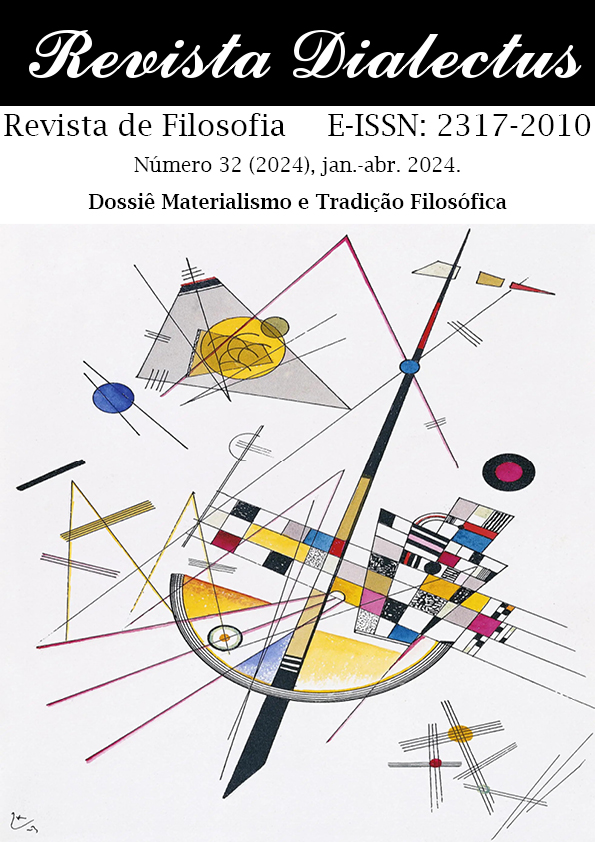O REMORSO NO PENSAMENTO DE LA METTRIE
DOI:
https://doi.org/10.30611/2024n32id93333Keywords:
La Mettrie, Remorso, Alma, FelicidadeAbstract
Em O Homem-Máquina, La Mettrie, trata da materialidade da alma e do corpo como uma máquina destinada a felicidade. Há nesse argumento um enfrentamento diante da compreensão da alma ser distinta dele, onde o médico-filósofo descreve que ela, como toda parte do corpo, seria afetada. O movimento do sangue no corpo a alcança e, quando o corpo dorme, ela dorme com ele. Esse argumento constitui o ponto de partida da presente exposição, que tem como objetivo compreender a origem do remorso em seu pensamento, se apresentando como uma reminiscência, como o resultado da experiência vivida. Em Anti-Sêneca ou Discurso sobre a Felicidade, o filósofo descreve a atuação da moral na máquina, de onde se propõe demonstrar o sentimento do remorso como um preconceito a ser combatido para o seu bom funcionamento. Cumpre demonstrar, a partir de uma revisão bibliográfica sobre o tema no pensamento de La Mettrie, o sentimento de remorso e de sua origem, pois ao naturalizar a alma humana, justifica ser o remorso um sentimento adquirido e alheio a máquina.
References
ASSOUN, Paul-Laurent. Lire La Mettrie. In: La Mettrie – L’Homme-Machine. Paris: Denoël, 1981.
BOISSIER, Raymond. La Mettrie – Médecin, Pamphlétaire et Philosophe (1709-1751). Paris: Les Belles Lettres, 1931.
CORDERO DEL CAMPO, Miguel Angel. Materialismo y Voluptuosidad en la Filosofía de Julien O. de La Mettrie. León: Universidad Secretariado de Publicaciones y Medios Audiovisuales, 2003.
___. Le Philosophe Selon La Mettrie. In: Dix-Huitiéme Siècle: Revue Annuelle. Paris: Garnier, 1969, pp.161-178.
LA METTRIE. O Homem Máquina. Tradução de António Carvalho. Introdução e notas de Fernando Guerreiro. Lisboa: Editorial Estampa, 1982.
___. Oeuvres Philosophiques. Tome I et II. Paris: Fayard, 1987.
___. Anti-Sêneca ou Discurso Sobre a Felicidade. Tradução de Arthur Araújo. In: Francisco Verardi Bocca e Arthur Araújo (orgs.) La Mettrie ou a filosofia marginal do século XVIII. PR: Curitiba: CRV, 2013.
MARKOVITS, Francine. La Mettrie, L’anonyme et le Sceptique. In: Corpus, Revue de Philosophie – 5/6 – La Mettrie, 1987.
___. La Mettrie et le Theme de l’Histoire Naturelle de L’homme. In: Matérialistes Français du XVIII Siècle. Paris: Puf, 2006.
___.Le Décalogue Sceptique. L’universel en question sur temps des lumières. Paris: Éditions Hermann, 2011.
MONZANI, Luiz Roberto. Sade – ou a individualidade desejante. In: Francisco Verardi Bocca e Arthur Araújo (orgs.) La Mettrie ou a filosofia marginal do século XVIII. PR: Curitiba: CRV, 2013.
QUÉPAT, Nérée. Essai sur La Mettrie Sa Vie et Ses Oeuvres. Paris: Librairie des Bibliophiles, 1873.
THOMSON, Ann. La Mettrie ou la Machine Infernale. In: Corpus, Revue de Philosophie – 5/6 – La Mettrie, 1987.
TISSERAND, Marcelle. La Mettrie Moraliste. In: La Mettrie, Textes Choisis. Paris: Éditions Sociales, 1954.
VARTANIAN, Aram. Introductory Monography. In: La Mettrie’s L’Homme Machine. A Study in the Origins of na Idea. Princeton University Press, 1960.
Downloads
Published
Issue
Section
License
Copyright (c) 2024 Elizângela Inocêncio Mattos

This work is licensed under a Creative Commons Attribution-NonCommercial-NoDerivatives 4.0 International License.
Authors who publish in this journal agree to the following terms:
- Authors retain the copyright and grant the journal the right of first publication, with the work simultaneously licensed under the Attribution-NonCommercial-NoDerivatives 4.0 International (CC BY-NC-ND 4.0) License, which allows the non-commercial sharing of work, without modifications and with acknowledgment of authorship and initial publication in this journal.
- Authors are authorized to take additional contracts separately, for non-exclusive distribution of the version of the work published in this journal (eg publish in institutional repository or as a book chapter), with acknowledgment of authorship and initial publication in this journal.
- Authors are allowed and encouraged to publish and distribute their work online (eg in institutional repositories or on their personal page) at any point before or during the editorial process, as this can generate productive changes as well as increase the impact and citation of published work (See The Free Access Effect).



















